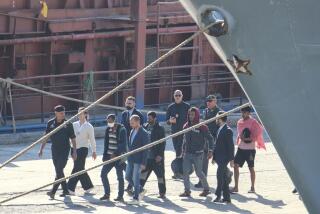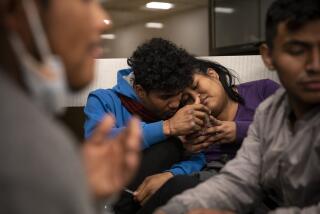Refugees Clog Border Post, Heading Home
- Share via
BLACE, Macedonia — The border crossing from Macedonia into Kosovo was more crowded Tuesday than the Santa Ana Freeway at rush hour, but also far more colorful. Ethnic Albanian refugees were trying to return home with their weathered Yugo compact cars packed with crates of eggs and tomatoes, jugs of gas, loaves of fresh bread and numerous children.
Long lines and Macedonian bureaucracy led to hours of waiting. Once through, however, the refugees sailed quickly past the Kosovo entry post manned by U.S. soldiers under a U.S. flag, blowing kisses and reaching out to touch the Americans as they passed.
Thousands crossed into Kosovo on Tuesday from Macedonia and neighboring Albania. The logjam here was a preview of what humanitarian officials are expecting in the coming days as more and more refugees retrace their steps home now that NATO forces have cleared the way.
Nevertheless, relief organizers are warning that the path is still fraught with dangers: Two refugees were killed by land mines as they tried to get back home.
Macedonia is requiring refugees who leave to relinquish residence permits, and loss of the permit is a big problem. Family patriarchs usually want to scout out how badly damaged their homes and villages are before bringing their families back. But with phone lines down in Kosovo, it is difficult to get in touch with their families.
Moreover, at least the Macedonian side provides shelter in refugee camps or homes of relatives or volunteers. All of the villages in the first 30 miles into Kosovo from Macedonia have been looted or devastated, and many appear to have no electricity.
Macedonian authorities seeking evidence that a car is registered and has insurance have turned back about half the vehicles arriving at the border.
The documentation is necessary, said Stevo Pendarovski, a spokesman for the Macedonian Interior Ministry, to ensure that the cars are not stolen.
Kosovo refugees were not required to show proof of registration in the chaos of their flight to the border. “We feel for returning back to Kosovo they must show some official documents,” Pendarovski said. “That’s the typical procedure.”
At the checkpoint Tuesday, UNICEF workers went car to car handing out leaflets in Albanian titled “Let’s Save Our Children From Mines,” which warned: Don’t touch anything strange, not even in your house. Keep clear of abandoned cars. Bridges are very dangerous. Never pull an unknown wire.
But inside Kosovo, stepping onto anything other than asphalt is a risk. Houses are stacked with debris and piled high with clothes and goods thrown about as looters searched for valuables. Some are burned.
Along the two-lane thoroughfare that is the main artery to the provincial capital, Pristina, NATO forces have used red tape to mark suspicious areas and suspected booby traps. Some of the booby traps use nearly invisible fishing line for trip wires.
Despite the warnings, however, no one waiting to cross the border turned back.
“We’re not a police force--we can’t stand there and say you can’t go home,” said Astrid Van Genderen Stort, an official of the U.N. High Commissioner for Refugees’ office.
The Raka family wasn’t deterred.
“We are going home--NATO and the U.S. are there,” said Mihrie Raka, 60, riding with her daughter-in-law, a cousin and four grandchildren ranging from 1 to 6 in a subcompact, its back window stuffed with bread loaves and tomatoes.
Raka’s son, a member of the rebel Kosovo Liberation Army, called to tell them it was safe to come back to Kacanik, even though the town hasn’t been de-mined.
As rain fell, Ismail Shabiu, 56, rolled plastic over the blankets heaped atop his car. Packed in the back seat of the old green subcompact Lada were two women and six children. Shabiu shared the front seat with his mother, 78-year-old Latife, who was clad in a long, traditional dress and kerchief.
U.S. Army soldiers searched passing cars for weapons, frisked passengers and allowed them to proceed.
“We’ve never seen so many people so happy to be frisked,” said Staff Sgt. Anthony Ross. As he spoke, one man touched his hand to his heart as he walked by, while an old woman in a kerchief blew him a kiss.
More to Read
Sign up for Essential California
The most important California stories and recommendations in your inbox every morning.
You may occasionally receive promotional content from the Los Angeles Times.










